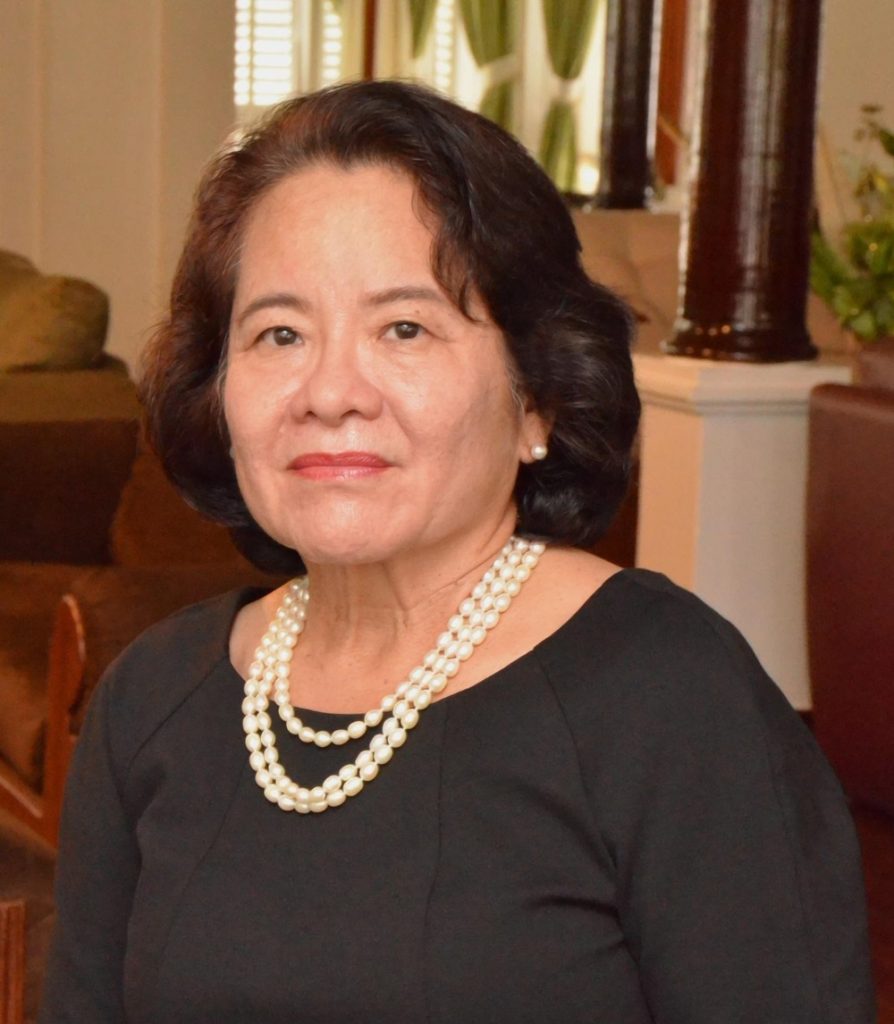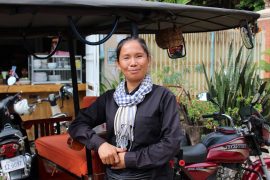Experts have said that mentorship for young girls and the youths as a whole is an important factor in grooming responsible citizens who will in the near future take up leadership positions. This can be done through training, skill acquisition and empowerment programs and tailored mentorship programs.
In an exclusive interview with Amazons Watch Magazine, the First Lady of Guyana H.E. Sandra Granger speaks on some of her activities geared towards curbing teenage pregnancy and creating a better life for the girl-child in her country. Excerpt:
Your Excellency, thank you for this opportunity to discuss some of your efforts to foster sustainable development in your country. Please tell us about your background and some of your experiences, growing up in Guyana.
I was the third child and third girl in a family of eight children. I was given chores to do from a very early age and I had to complete these before I left for school in the mornings and when I got home in the afternoon. As the younger children came along, we helped to look after them.
I was educated by the Sisters of Mercy at the primary and secondary levels and have happy memories of my growing years.
There were many large families in those days and the city was less built up, with fruit trees in practically every yard in our neighbourhood. We kids – boys and girls – played many games and pranks together.
The adults watched out for all the children, so we were pretty safe.
Over the years, you have demonstrated efforts and passion to create a better life for all. Kindly tell us what awakened the spirit of philanthropy in you.
My beliefs and actions today are based on the grounding I received from my parents and teachers. My mother, in particular, taught us to respect every person, regardless of economic and social standing, and to try to understand their behaviour. She also is a great believer in education as a means of empowerment, so she made many sacrifices to ensure that her children got a good primary and secondary education. My childhood experiences have led me to believe that poverty is a crime and that persons can be inspired to achieve their potential through education and empowerment. I think that these guide my actions. I am happy to say that my husband supports my efforts.
Your country has a relatively high rate of adolescent pregnancy in both the Caribbean and South America, with 97 out of every 1,000 girls between the ages of 15 and 19 giving birth, according to the State of the World Population 2013 report. Kindly tell us about some of your programmes as well as the successes recorded in addressing this trend in recent times.
I agree. The rate of adolescent pregnancy is unacceptably high. In my discussions with adolescent mothers, I have discovered that these girls became pregnant not only because they yielded to a boyfriend, but because they were victims of rape, incest, and human trafficking. We are therefore dealing with social, psychological and economic issues when we examine teenage pregnancy.
I work with a non-governmental Organisation, Women Across Differences (WAD), to help these girls complete their secondary education, or to study and learn a trade if they so desire. WAD was supported by UNFPA and is currently supported by Republic Bank Guyana in the conduct of a year-long comprehensive programme for the empowerment of teen mothers who are counselled, taught parenting and life skills, craft and so on, and encouraged to continue their education. They are also encouraged to participate in workshops organised by my office and several of them have done so.
The teen mothers have developed self-esteem and self-confidence. Those who have graduated from the programme have formed a group called Young Mothers for Change which works to support each other, and also with their peers advising against repeat pregnancies, on protection from sexually transmitted diseases and so on. Some have participated in conferences locally and overseas and have acquitted themselves well.
Several of the girls, mainly those with training in hair care and cosmetology, have participated in “Glam Days” organised for senior citizens in a collaborative effort of Luminous Women (an informal group of which I am a member) and WAD. Both the seniors and the girls have stated that they enjoy these experiences of inter-generational interaction.
In order to reduce teenage pregnancy, I believe that there should be comprehensive, appropriate public education about sexual and reproductive health, so that our children are aware of, and informed about these issues. Happily, our Ministry of Public Health has introduced Adolescent Clinic Days at our public health centres, where teen mothers and fathers receive information and services.
Teen pregnancy and its attendant issues are a matter which has been discussed among Spouses of CARICOM Leaders. as well as in the context of the Pan-Caribbean Partnership against HIV and AIDS.
HIV/AIDs is the leading cause of death among adults aged 24-44, according to findings, increasingly affecting the youth, especially young girls, with a prevalence rate of 2.5 percent. What is your take on this and your efforts in tackling HIV/AIDs in Guyana?
The perspective with regard to HIV and AIDS has changed much since the discovery of AIDS. A diagnosis of HIV is no longer a death knell. The successes achieved by individual countries in CARICOM are due in large part to the commitment of governments and to the Pan Caribbean Partnership against HIV and AIDS (PANCAP). Its membership comprises countries as well as governmental and non-governmental institutions and agencies and donors working together to end the AIDS epidemic. The successes include-
- a) PANCAP was designated an international best practice by UNAIDS in 2004.
- b) It negotiated a reduction in the cost of anti-retroviral drugs which led to an increase in ARV coverage. AIDS-related deaths have declined by 49 percent.
- c) The latest data show that the prevalence of HIV in the region is now 1.3 percent.
- d) in respect of the 90-90-90 target, 69 percent of the people living with HIV know their status, of whom 84 percent are on treatment and 69 percent are virally suppressed. So while we are moving forward, more still needs to be done.
- e) The number of people accessing ARVs doubled between 2000 and 2016. However, only half of those people have access to viral load testing. In this regard, I can report that 75 percent of the people on ARV in Guyana are achieving viral suppression.
- f) Four out of five people who know their status are on treatment.
- g) While Cuba became the first country in the world to eliminate mother-to-child transmission of HIV in April 2015, ten other countries in the Caribbean achieved this by the end of 2016.
It is a matter of concern that young girls are a large number of persons newly infected with AIDS. This requires firm and strong action, which would include comprehensive health and family life education in all our schools, a public education campaign, and aggressive prosecution of the perpetrators of rape, incest and human trafficking who have denied the human rights of their victims.
Our efforts to tackle HIV/AIDS in Guyana must include involvement of all stakeholders, including health professionals, faith-based organisations, labour, public and private sector organisations and international partners, to address this issue and deal with it in a manner which removes the taint of stigma and discrimination against people infected and living with HIV and AIDS. Stigma and discrimination cause some people not to seek treatment when they discover their status. We must accept and promote their access to health care as a right.
Kindly share in details some of the successes of your projects, such as Self-Reliance and Success in Business for Women, Child Care, Caring for the Elderly and ICT workshops and programmes for women, teenage mothers, adolescents and out of school youth.
Thank you for asking about my projects. In respect of the Self-Reliance and Success in Business Workshops for Women, which are conducted through collaboration with the Guyana Ministry of Social Protection and Interweave Solutions, we have trained over 600 persons, including some men who asked to participate in the training, for all ten administrative regions in the country. The workshop teaches participants how to successfully run a business and to recognise and balance the link between their professional and private life and their communities.
The certificate awarded at the end of the workshop is recognised by the Small Business Unit and microenterprise organisations so that these participants can access loans and grants. We follow up with them and they call on the facilitators for advice. One of our participants won the third prize for her business plan in a national business expo. Others have come together to work as groups. We have had women who are very proud that they have completed the workshop and now have another “piece of paper” with their name. Some have spoken about leaving an abusive relationship as soon as their business is up and running. Some of our teen mothers who participated have spoken about plans to improve their businesses.
We plan to conduct two training of trainers workshops before the end of this year so that there will be persons qualified to train and monitor other women in all parts of the country.
Consideration is also being given to conducting other workshops in some vast areas where we were unable to reach all sectors.
As regards the Caring for the Elderly and Child Care Workshops, these include a component in First Aid, so we work with the Guyana Red Cross Society which conducts an intensive first aid and CPR programme to accompany the training the women and girls receive in caring for our seniors and in childcare. As I mentioned earlier, our teenage mothers and some girls who have been rescued from trafficking have benefitted from these programmes.
The certificate awarded at the end of the workshops are also recognised by the National Board of Industrial Training. So far, we have conducted four Caring for the Elderly and one Child Care workshop, with a second, planned later this year.
Three ICT Workshops have been conducted for adolescents and out-of-school youth, in which they have not only been exposed to ICT, but also modules on life skills and preparing for the world of work, sexual and reproductive health, micro-enterprise and, most recently, robotics. These were conducted on the East Coast Demerara for young people mainly from Buxton, Friendship, and Victoria villages. I am happy that some of our graduates have been employed as data entry clerks at our National Data Management Authority. Some have gained employment elsewhere and some are still in school.
My office was happy to be asked by our Board of Industrial Training to coordinate an ICT Workshop based on our project for young people on the East Bank Demerara and that workshop commenced on 11 September.
My Buxton Youth Development Initiative was a pilot remedial education project begun two years ago with children from three primary schools in the Buxton/Friendship area. It was developed in collaboration with leaders and teachers in the community, and targeted mainly children who were struggling in school; we also included children who were doing well but might be experiencing other challenges. The parents were asked whether they would agree to their children participating in the Initiative.
Based on advice from the teachers, we provide the children with a nutritious snack prepared by a member of the community before the classes, which are held thrice weekly during the school term and which follow the national curriculum. Over 180 children benefit from the programme and their performance has improved. My belief in the benefits of these classes was vindicated when the headmistress of one of the participating schools reported this year that the literacy rate in that school had risen from 57 percent to 83 percent in the period since the programme began.
A similar programme – the Lusignan Youth Development Initiative – was launched in another village with one primary school at the start of the 2016/2017 school year. We have over 80 children participating in that project.
We provide three of the best performing children from each class with vouchers for one of our leading bookstores.
I regret that my budget does not allow me to embark on more of these Initiatives. Children just need the opportunity and encouragement to succeed in school.
I am also involved in the Kind Soles Project in collaboration with REThink Organisation of Trinidad and Tobago through which we provide “shoes that grow” to children in our vast hinterland, some of whom go to school barefoot and are therefore prone to infections. These shoes are donated by Guyanese and Caribbean individuals and organisations at home and abroad. Caribbean Airlines generously ships these shoes to Guyana free of cost.
Recently the Central Islamic Organisation of Guyana donated some shoes and supplies which came in very handy when villages of our Potaro-Siparuni region were flooded.
I have also been working with the STEM Guyana project spearheaded by a Guyanese “techie,” Karen Abrams, which began in August 2016, introducing our children to Robotics. She also trained interested persons, young and not so young, as trainers and to coordinate clubs which were set up after the initial workshops. I am very proud of the achievement of our young people, who were invited to the First Global Robotics Olympics in Washington, DC, in July of this year and placed tenth out of 165 countries at the end of that competition.
We are now expanding to include scratch programming and mathematics and hoping to establish clubs throughout the country.
I must thank all the individuals and institutions, public and private, at home and in the diaspora, who have generously supported and continue to support my efforts, not least among whom are my staff. I could not accomplish all these things without them.
What’s the best way for the readers of Amazons Watch Magazine to connect with you?
I can be contacted via my Facebook page, HE Sandra Granger or my website, www.sandragranger.com. You can also email receive information on my activities through the Website of the Ministry of the Presidency of Guyana.




